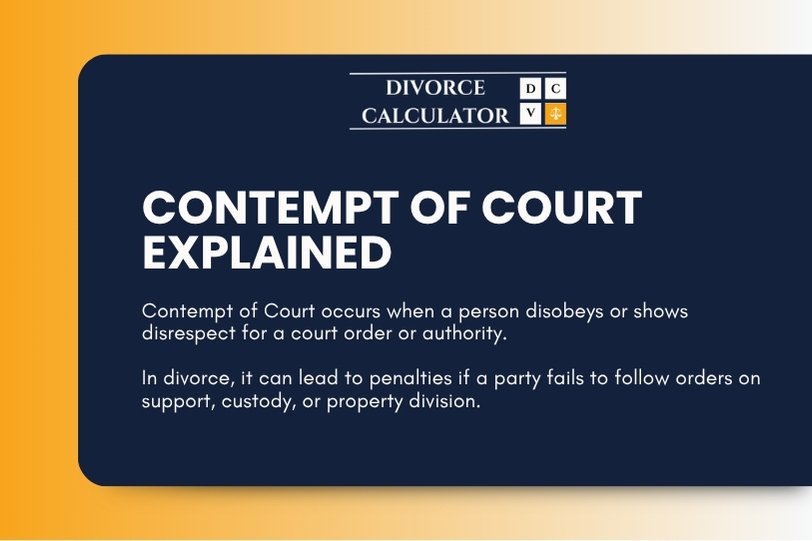Contempt of court is a legal finding that someone has disobeyed or shown disrespect for a court order or the authority of the court. Understanding contempt of court helps us recognize the importance of following court procedures and respecting legal decisions. This is not just a technical legal issue—contempt can have serious consequences, including fines and even jail time.
As we examine what constitutes contempt, it’s important to know how our actions inside or outside the courtroom can impact a case. Recognizing the boundaries of lawful conduct protects us from unintended violations and maintains the integrity of the legal system.
Key Takeaways
Contempt of court is a legal mechanism designed to maintain the authority and dignity of courts. We can be held in contempt if we disobey court orders, disrupt proceedings, or show disrespect toward the judge.
There are two main types of contempt: civil and criminal.
- Civil contempt helps ensure compliance with court orders.
- Criminal contempt punishes behavior that undermines the court’s authority.
We should remember that contempt can be punished by fines, imprisonment, or both. Penalties depend on the nature and severity of the offense.
Defenses are available. If we act unintentionally, or if the order was ambiguous, we may have grounds to challenge a contempt finding.
| Type | Purpose | Typical Penalty |
|---|---|---|
| Civil Contempt | Enforce compliance | Fines, imprisonment |
| Criminal Contempt | Punish misconduct | Fines, imprisonment |
Legal representation is crucial if we face contempt proceedings. Understanding the rules can protect our rights and help us navigate court requirements.

Why It Matters In Divorce
When we go through a divorce, court orders often set the foundation for custody, visitation, child support, and division of property. If one party ignores these orders, contempt of court can become an essential tool for enforcement.
Contempt issues commonly arise when:
- Child support payments are missed.
- Visitation schedules are not followed.
- Marital property is not divided as ordered.
Each time a party disobeys a court order, it can disrupt the lives of everyone involved—especially children. We depend on the court to enforce its rulings so that both parties fulfill their obligations.
Filing a motion for contempt can help us address noncompliance. In some cases, the court may impose fines, award legal fees, or even order jail time.
Here is a simple summary of potential outcomes if contempt is found:
| Situation | Possible Court Response |
|---|---|
| Missed child support | Wage garnishment, fines |
| Ignoring custody orders | Modification of custody, fines |
| Withholding property | Asset seizure, legal costs |
By respecting court orders in divorce cases, we help ensure stability and fairness for our families. Using contempt proceedings can be necessary to uphold our rights and responsibilities.
Real-Life Examples
Contempt of court can take many forms. Let’s consider a few real events to clarify these situations.
Example 1: In 2019, a journalist was fined for refusing to reveal a confidential source during a criminal trial. By not following the court’s order, the journalist was found in contempt.
Example 2: We have seen attorneys held in contempt for repeatedly interrupting judges or failing to follow courtroom procedures. Courts take such behavior seriously, as it disrupts legal proceedings.
| Year | Description | Outcome |
|---|---|---|
| 2019 | Journalist refused to reveal source | Fined for contempt |
| 2021 | Defendant posted trial details on social media | Jailed overnight |
Example 3: In 2021, a defendant used social media to share restricted details about their ongoing trial, despite a clear court order. The judge ordered a jail sentence for contempt.
These examples show that contempt of court can impact journalists, lawyers, and regular citizens alike. It’s important for all of us to recognize the boundaries set by the court and comply with its orders.
How States Handle Contempt Of Court
Contempt of court is enforced differently based on each state’s laws and procedures. We see variations in definitions, penalties, and processes for addressing both civil and criminal contempt.
New York
In New York, contempt laws are codified in both the Judiciary Law and the Civil Practice Law and Rules (CPLR). We need to distinguish between civil and criminal contempt, as remedies and penalties differ. Civil contempt usually aims to compel compliance, with possible fines or imprisonment until the order is followed. Criminal contempt can result in set jail terms or fines, used to punish behavior disrespecting court authority.
Contempt charges may arise from actions like refusing to testify, violating restraining orders, or disrupting court proceedings. Judges have discretion, but procedures generally require a clear warning and an opportunity for the accused to explain or apologize. Immediate summary punishment is rare except for behavior directly witnessed by the judge. For indirect contempt, a formal hearing is required, and the defendant is afforded procedural protections such as notice and the opportunity to present evidence.
California
California handles contempt under its Code of Civil Procedure, sections 1209-1222. Civil and criminal contempt are both addressed, with particular attention to due process. Direct contempt (occurring in the court’s presence) may lead to immediate sanctions, while indirect contempt (outside the courtroom) requires written charges and a hearing.
Contempt may stem from disobedience of court orders, abusive language, or disrupting court operations. We observe that penalties can include fines up to $1,000, jail time not exceeding five days for each separate act, or both. For family law cases, especially child custody and support, enforcement is strict. Contemners are usually given notice and the right to counsel when incarceration is possible. Courts must prepare written findings if jail is imposed, ensuring transparency.
Texas
In Texas, contempt is primarily governed by Chapter 21 of the Government Code and the Family Code for family matters. Courts may address civil contempt to compel a person to follow court orders, with incarceration possible until they comply. Criminal contempt serves to punish past violations, often resulting in fines, jail, or both—jail terms can reach up to six months per contempt finding.
Common violations involve court order disobedience, especially in child support, custody, and divorce proceedings. The accused is entitled to notice, a hearing, and in criminal cases, may request a jury trial if facing jail time. Notably, Texas law outlines specific procedures for contempt in family law, including the use of enforcement motions and clear evidence for willful noncompliance. Proof standards differ: for punitive contempt, the state must meet the beyond-a-reasonable-doubt threshold.
Florida
Florida’s approach is outlined in both its statutes and court rules. Contempt is separated into direct (committed in court) and indirect (outside the judge’s immediate view), with distinct processes for each. Direct contempt can be punished summarily with a brief hearing, but documentation of the misconduct is required.
For indirect contempt, written allegations start the process, followed by a hearing where the accused can present a defense and is entitled to legal representation. Judges can impose fines or jail for refusal to follow court orders, with especially clear procedures in family law (child support, alimony, restraining orders). Florida emphasizes constitutional safeguards, requiring proof beyond a reasonable doubt for criminal contempt. Guidelines also mandate specific findings and written orders detailing the conduct and the punishment given.
Tips If You’re Dealing With Contempt Of Court
If we’re facing a contempt of court accusation, it’s important to stay calm and avoid reacting with anger or frustration. We need to understand exactly what the court order requires so we don’t accidentally violate its terms.
Key steps to consider:
- Read all court documents carefully.
- Keep detailed records of all interactions and compliance efforts.
- Communicate respectfully with the court and all involved parties.
If we’re unsure about any part of a court order, we should consult our lawyer for guidance. Legal advice helps us avoid unintended violations and clarifies our next steps.
Missing deadlines or failing to act can make the situation worse. We should act promptly if the court or the opposing party raises issues about compliance.
Here’s a quick checklist:
| Task | Action Needed |
|---|---|
| Review court orders | Read all instructions closely |
| Gather documentation | Save emails, texts, receipts |
| Consult legal counsel | Ask questions as needed |
| Respond to the court | Meet all deadlines |
Documentation is crucial. We ought to keep copies of any evidence that shows we’re following orders.
Finally, we need to attend all court hearings as scheduled. If something prevents us from appearing, we should notify the court right away.
Frequently Asked Questions
We examine the legal consequences of contempt, including potential jail time and differences between civil and criminal contempt. Our focus is on specific scenarios such as child support violations, process details, and influential case law.
What are the potential consequences of being found in contempt of court?
Contempt of court can result in fines, imprisonment, or both. Courts may also order other remedies, such as community service.
Penalties depend on the nature of the contempt and the jurisdiction. Repeat or severe violations can lead to harsher consequences.
Can a contempt of court charge lead to imprisonment, and if so, for how long?
Imprisonment is a possible penalty, especially in cases of direct defiance or repeated violations. The length of imprisonment varies based on whether the contempt is civil or criminal and local laws.
Civil contempt jail time often lasts until the individual complies with a court order. Criminal contempt sentences are fixed and set by the court.
In what ways can one be held in contempt regarding child support matters?
Failing to pay court-ordered child support may lead to contempt proceedings. Ignoring visitation orders or not providing required information are other ways.
Courts may respond by imposing fines, wage garnishments, or even jail time to enforce compliance.
What distinguishes civil contempt from criminal contempt?
Civil contempt aims to compel someone to follow a court order. The goal is compliance, not punishment.
Criminal contempt punishes actions that disrespect the court or obstruct justice. It often involves penalties meant to deter future misconduct.
How does the process of charging someone with contempt of court unfold?
Contempt proceedings usually start with a motion or petition filed by a party or the court itself. The accused has the opportunity to respond and present evidence at a hearing.
A judge then decides if contempt occurred and determines any penalties or orders needed.
Are there particular cases that set precedents for contempt of court rulings?
Several appellate and Supreme Court cases have clarified the limits of judicial power in contempt cases. For example, Shillitani v. United States (1966) discusses civil contempt confinement and due process rights.
Other cases, such as Bloom v. Illinois (1968), address the distinction between civil and criminal contempt. These precedents ensure procedures remain fair and clearly defined.



